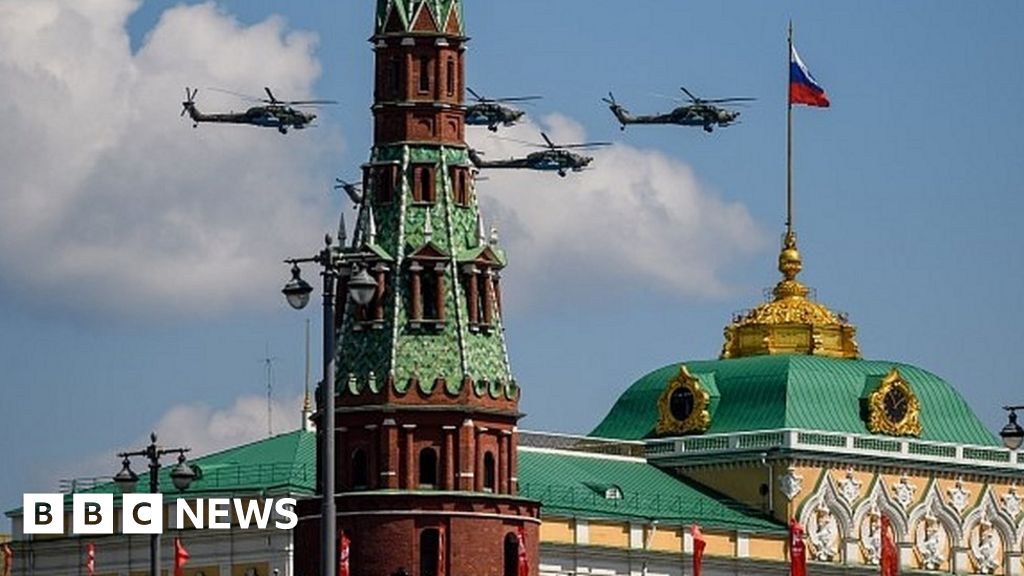
Ministers are considering strengthening security laws after a report by MPs said the UK had "badly underestimated" the threat of foreign interference, including subversion by Russia.
Downing Street sources said a new law requiring foreign agents to register in the UK was being looked at by No 10.
But the BBC's Chris Mason added there were currently "no firm proposals".
It comes as Labour criticised "systemic failings" in how the UK has dealt with Russia and other "hostile states".
As the government prepares to face questions in the Commons later, shadow home secretary Nick Thomas-Symonds said Russia's "growing threat" could not be ignored.
He added the government had failed to offer the UK's security services "the strategic support, the legislative tools or the resources necessary" to defend the country's interests.
Foreign Secretary Dominic Raab said on Tuesday: "We've been clear that Russia must desist from its attacks on the UK and our allies.
"We will be resolute in defending our country, our democracy and our values from such hostile state activity."
The government faces calls to do far more to counter Russian espionage and subversion after Parliament's Intelligence and Security Committee said the UK was the main target after the US and Nato.
In a 50-page report, the committee said the UK was "clearly a target" for disinformation campaigns around its elections, but that the issue was described as a "hot potato", with no one organisation taking a lead to tackle it.
The new law under consideration could mirror the new "Espionage Act" suggested by the committee, which would make it explicitly illegal to be a spy in the UK, BBC political correspondent Chris Mason reported.
Such an Act would compel those who represent the interests of foreign powers to register on arrival in the UK. Those who did not - and so operated covertly - would be breaking the law.
A report in the Times newspaper said any new legislation would aim to make the UK a "harder environment for adversaries to operate in" and could be modelled on similar laws in the US and Australia.
If you do not seek, you do not find.
Whether deliberate or deficient, the Intelligence and Security Committee's very long-awaited report outlines gaping holes in the UK's handling of the threat from Russia.
For years, it seems a lack of priority, and a lack of curiosity, allowed the risks to go unmonitored, if not to go unchecked.
The UK government has now stiffened its attitude to Putin's Russia.
The MPs' report claimed the government made no effort to investigate claims of Russian interference in the EU referendum and criticised intelligence agencies for not giving the issue more attention.
And it said the government only "belatedly realised the level of threat which Russia could pose" after the so-called "hack and leak" operation against the Democrats in the 2016 US election, calling it a "game changer".
'Tools and resources'
Labour will later use an Urgent Question in Parliament to highlight what it says are multiple "shortcomings" in the UK's national security policy shown up by the report.
Mr Thomas-Symonds said: "On every level the government's response does not appear to be equal to the threat.
"The UK has world leading security services, yet this report makes clear they have not received the strategic support, the legislative tools or the resources necessary to defend our interests.
"The government need to urgently outline how they will address these systemic failings."
Amid growing tensions with China, he said the report "should also sound alarm bells ringing that other countries that wish the UK harm are undertaking similar activities and are not facing a sufficiently robust response".
The government has rejected the committee's call for a full assessment by intelligence agencies of potential Russian meddling in the 2016 EU referendum, saying it had "seen no evidence of successful interference".
Mr Raab "categorically rejected" claims by SNP MP Stewart Hosie, a member of the ISC, that the government "actively avoided" looking for evidence of Russian interference.
Downing Street was accused of holding back the report ahead of December's UK election and for delaying its nominations to set up the new committee - both claims it has denied.
The Russian Foreign Ministry called the report "Russophobia".
World - Latest - Google News
July 22, 2020 at 09:11AM
https://ift.tt/32EdARH
Russia report: UK considers tougher security laws after criticism by MPs - BBC News
World - Latest - Google News
https://ift.tt/2SeTG7d
Bagikan Berita Ini














0 Response to "Russia report: UK considers tougher security laws after criticism by MPs - BBC News"
Post a Comment